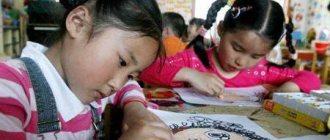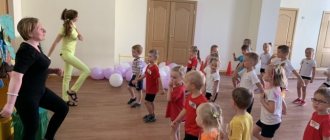Task 1 “If you ask, I will answer”
Each team defines the word “collaboration” and each team writes their definition of the word on the board.
- Not only the teacher’s openness and willingness to work with families, but also his ability to organize joint creativity;
- Involving parents in bright, interesting, promising joint activities;
- General approaches, discussion and search for options for future activities;
- Psychological equality of educators and parents;
- Respectful attitude towards differences in opinions and approaches in solving problems of joint activities;
- Discussion of each participant’s opinion on the results of joint activities.
Task 6 “Piggy Bank of Wise Thoughts”
Next task: solving pedagogical situations. I offer you a conflict situation, and you must find a way out of it. Teachers are asked to determine their attitude to the behavior of parents, distribute the text on cards and role-play the teacher-parent situation.
- a mother complains to the teacher that her child comes home from kindergarten bitten;
- parents bring an obviously undertreated child to kindergarten without a medical certificate and demand that you accept the child, because they simply have nowhere to take the child. You need to politely and tactfully explain to the parents that you cannot accept such a child;
- a mother complains to the teacher that her child comes home from a walk in dirty clothes;
- Mom comes to the teacher for advice: we have a second child in our family. How to help an older child adapt to the arrival of a baby?
- The teacher, talking about the role of physical activity in the physical development of preschoolers, advises parents to buy their children lightweight sportswear for physical education, and in response hears an indignant exclamation: “Well, here’s another thing, my child will wear a warm suit! I know better what to dress him in!”
- Marina attends a speech therapy group. The girl’s speech requires regular completion of individual tasks. However, Marina does not fulfill them, explaining this by the fact that her mother goes to shaping sessions and does not have time to work with her.
- Tanya’s mother comes to the manager with tears in her eyes: “This is outrageous! The child has a bruise again. Why do teachers get paid?” After admonitions from the head of the kindergarten, having calmed down somewhat, he declares: “Take action, otherwise I will complain to higher authorities!”
- Sasha is withdrawn, passive in class, and often shows aggression towards his peers. Sociometric examinations showed that the child belongs to the category of outcasts, and the teacher advised the mother to consult a psychologist about this. Mom reacts violently, proving that her son has many friends, talking about his favorite activities at home.
Having summarized the teachers’ statements,
the senior educator talks about the negative aspects encountered in the work of educators.
On the part of teachers today, there is also a not entirely correct position: ignoring the opinion of parents, ignorance of the conditions of family upbringing, extolling their own successes and merits, labeling (“An apple from an apple tree...”, “Such parents have such a child, no wonder!”) - everything this allows us to talk about different types of behavior of educators.
Task 2 “You for me, I for you”
During the discussion, teams fill out tables
Each team takes out a question for discussion and after discussion as a team, writes the answer on the board.
Questions for discussion:
Teachers' conclusions:
1.Family functions.
Educators must come to the conclusion that they are common.
Both the family and the kindergarten create conditions for the comprehensive development of the child.
They give the child primary socialization.
They create an atmosphere of love, warmth, conditions for the emotional and mental maturation of the child.
2.Functions of kindergarten.
3. The role of the teacher.
I teach, I develop.
4.The role of the parent.
The sponsor asks the teacher to teach, educate directly or indirectly.
5.Why do parents send their child to kindergarten?
The family does not have the means and material and living conditions for education.
Parents have to work and have no one to leave the child with.
Parents lack pedagogical knowledge.
The family does not have a healthy psychological climate.
The family cannot provide the child with full communication with peers and adults.
The senior teacher sums up the results:
- Regarding questions 1 and 2: why are the functions the same, but there is no mutual understanding?
- Regarding questions 3 and 4: the parent is the customer, the teacher, if it’s not offensive, is the service staff. The child is between the demands of the teacher and the demands of the parent.
- The child was sent to kindergarten, we, teachers, take on the upbringing and education.



